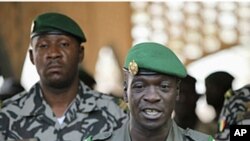The African Union Commission peace and security director said the AU’s stance against Mali’s coup leaders is part of a continuing effort to strengthen the continental body’s capacity against unlawful leadership changes in Africa.
El Ghassim Wane told VOA in an interview this week the AU is making “continuous efforts” to “strengthen its capacity to deal with all kinds of unconstitutional changes to governments”.
Wane said democratization “is a process that African countries have embarked upon for two decades now, and we have made a lot of progress.”
But he acknowledged there have been setbacks along the way.
Mali’s recent coup was a relatively clear cut example of an illicit power grab, prompting a swift and severe response from the AU and regional bloc ECOWAS.
Some situations are more ambiguous.
In the Gambia, opposition parties have protested the results of last month’s legislative election in which President Yahyeh Jammeh’s party earned an overwhelming victory. The main opposition parties had boycotted the poll, saying manipulations and intimidation by the ruling party and the military made a fair vote impossible.
The preliminary report from the AU observer mission said the vote was generally peaceful and lawful. But it also cited serious irregularities, including the opposition boycott, as well as cases of intimidation, a gross imbalance in the financial means of the incumbent and his challengers, and the uneven allocation of public funds.
But the AU has not called for repercussions against the Gambia or refused to recognize the results.
In contrast, the AU suspended Ivory Coast and imposed sanctions against the West African country after President Laurent Gbagbo claimed victory in a presidential election that many international observers said had been won by his opponent, Alassane Ouattara.
Mr. Ouattara was sworn in as president after Ivorian forces, with support from the French military and United Nations peacekeepers, ousted Mr. Gbagbo.
The AU commission’s Wane stressed that democratization is a process that is conducted at national levels. He declined to comment specifically about the AU’s response to the Gambian polls.
Wane said the AU does monitor the conduct of elections across the continent. And he said, “globally, we see that a lot of progress has been made, and the commitment by the AU and African countries to deepening the democratization process is really clear.”
Wane continued, “commitments have been made in the context of the AU and the challenge of course for all concerned is to make sure that those commitments are implemented” as Africa pursues its democratization agenda.”




